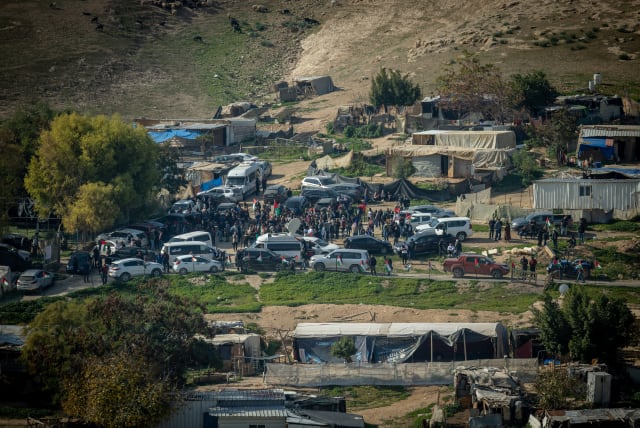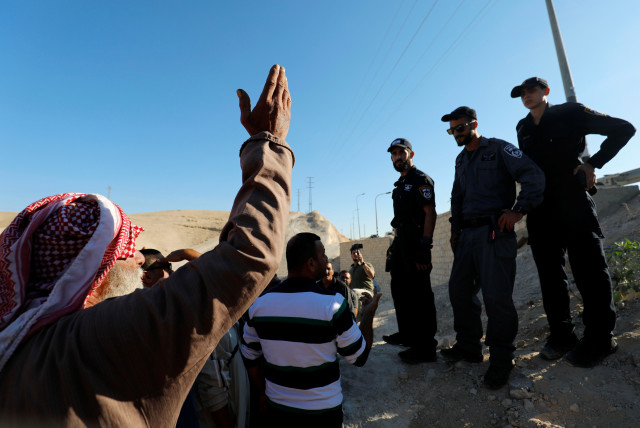Netanyahu nixes draft law meeting for Khan al-Ahmar parley to calm crisis

The evacuation of Khan al-Ahmar has been delayed multiple times over the last few years since the petition was filed.
Prime Minister Benjamin Netanyahu sought to quickly end a coalition crisis over Khan al-Ahmar by nixing the meeting on the draft law in favor of a renewed discussion with Finance Minister Bezalel Smotrich about the possible evacuation of the illegal West Bank herding village.
Defense Minister Yoav Gallant and National Security Minister Itamar Ben-Gvir were also expected to participate in the 7 p.m. parley to set the state’s response to a High Court of Justice petition due Sunday.
According to media reports, the state had intended to ask the court to drop the petition in favor of an agreement with the over 200 members of the Abu Dahuk clan of Jahalin Bedouin who live in the hamlet of tents and huts perched on top of Route 1, just below the Kfar Adumim settlement.
Controversy surrounding the move
The text of the court submission was drafted, however, without the inclusion of Finance Minister Bezalel Smotrich, who is also a minister within the Defense Ministry. As such, he has authority over matters relating to civilian life in Area C of the West Bank, where Khan al-Ahmar is located.
On Sunday, he accused Netanyahu of breaking the coalition agreement and another one he had signed with Gallant by drafting the state submission without him.
״I am surprised that no orderly discussion was held in my presence regarding the formulation of the state’s response on this matter,” wrote Smotrich on Sunday in a sharply worded letter to Cabinet Secretary Yossi Fuchs.
“Section 21.4 of the coalition agreement stipulates that submissions to the High Court are to be approved by the additional minister at the Defense Ministry,” Smotrich wrote to Fuchs.
Smotrich clarified that Section 14 of a separate agreement with Defense Minister Yoav Gallant states that he is responsible for the formulation of the upper political echelon’s legal position on matters that pertain to his subjects under his auspices.
Despite these agreements, Smotrich said, he was sent the text of the state’s response to the High Court of Justice over the weekend, without any attempt to involve him in the process.
“The content of the state’s answer that was forwarded to me for approval is not consistent with my policy and the government’s policy as I understand it,” said Smotrich, who heads the Religious Zionist Party.
He asked that the discussion on the state’s position be held anew in his presence and that the state responds to the court only after such a discussion.
Ben-Gvir, who heads the Otzma Yehudit Party, said he backed Smotrich.
“We were elected and given a mandate to implement right-wing policies, and right-wing policies means [right-wing] governance first and foremost. We must not bend to Khan al-Ahmar” and Smotrich has done well not to allow that agenda to be hijacked.
The evacuation of Khan al-Ahmar has become an important political symbol for the Israeli Right in its battle to ensure that Area C is included within the final borders of the State of Israel.
It has similarly become significant for the Palestinians and the Israeli Left of the need to maintain that territory for inclusion in the final borders of a Palestinian state.
The Abu Dahuk clan has explained that they have been herding their goats and sheep in that area since the early 1950s after Israel expelled them from the Negev.
Israel has never legalized the clan’s huts and tents, which have been in their current location since at least the 1970s.
The right-wing nongovernmental group Regavim has unsuccessfully petitioned the court since 2009 to force the government to evacuate the village. On Sunday, it said that it appears the state “intends to file for the case to be closed on the grounds that the issues at its core are political, and not legal matters.
“If this is indeed the state’s response, the present government has no right to exist."
“As of this moment, four months after its establishment, it seems that the only policy that this government is promoting is left-wing policy: no judicial reform, no Zionist response to the wave of terrorism, no governance in the Negev, no effort to stop the Palestinian Authority’s hostile takeover of Area C and no evacuation of Khan al-Ahmar.”
The court had issued a non-binding ruling in 2018 that the village’s tents and huts could be destroyed. Netanyahu initially pledged to raze the village and relocate its residents but halted action on the matter after the former International Criminal Court’s chief prosecutor Fatou Bensouda warned that such a step could be considered a war crime.
The international community, including the United States and the European Union, has urged Israel not to evacuate the village.
Former defense minister and Yisrael Beytenu head Avigdor Liberman, who is in the opposition, but who is otherwise considered a centrist right-wing politician, chided Netanyahu for not evacuating Khan al-Ahmar.
He noted that Netanyahu split the city of Hebron, placing most of it under the auspices of the Palestinian Authority, and he did not initially leave the government when it decided to evacuate 21 Gaza settlements in 2005.
But when it comes to Khan al-Ahmar, suddenly it’s a “sensitive” situation. Even though the court has allowed for the evacuation of Khan al-Ahmar, Netanyahu is “looking for any way to legitimize the Palestinian takeover of the state’s land.”
Jerusalem Post Store
`; document.getElementById("linkPremium").innerHTML = cont; var divWithLink = document.getElementById("premium-link"); if (divWithLink !== null && divWithLink !== 'undefined') { divWithLink.style.border = "solid 1px #cb0f3e"; divWithLink.style.textAlign = "center"; divWithLink.style.marginBottom = "15px"; divWithLink.style.marginTop = "15px"; divWithLink.style.width = "100%"; divWithLink.style.backgroundColor = "#122952"; divWithLink.style.color = "#ffffff"; divWithLink.style.lineHeight = "1.5"; } } (function (v, i) { });

